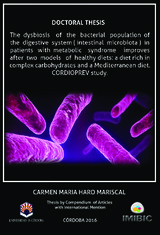The dysbiosis of the bacterial population of the digestive system (intestinal microbiota) in patients with metabolic syndrome improves after two models of healthy diets: a diet rich in complex carbohydrates and a Mediterranean diet. CORDIOPREV study
Autor
Haro Mariscal, Carmen María
Director/es
Pérez-Jiménez, FranciscoCamargo García, A.
Editor
Universidad de Córdoba, UCOPressFecha
2017Materia
Digestive systemMetabolic syndrome
Intestinal microbiota
Probiotics
Prebiotics
Mediterranean diet
Healthy diets
Intervention studies
CORDIOPREV
METS:
Mostrar el registro METSPREMIS:
Mostrar el registro PREMISMetadatos
Mostrar el registro completo del ítemResumen
The microbial community harbored in the human intestine, commonly known as
the gut microbiota, is considered an organ fully integrated in the host which plays an
important role in metabolism, physiology, nutrition and the immune function. The gut
microbiota has coevolved with us and the changes in its composition and/or structure
can have major consequences for human health and disease. At present, it is known that
microbial imbalance or dysbiosis of the gut microbiota is associated with metabolic
disorders such as Metabolic Syndrome, Obesity, Type 2 Diabetes and Cardiovascular
Disease. In fact, some studies have suggested that changes in the intestinal microbiota
may trigger pathogenic mechanisms that promote inflammation, insulin resistance and
the development of Metabolic Syndrome. In this context, the relationship between the
composition of the intestinal microbiota and human health has led to the design of
strategies to promote the prevalence of beneficial bacteria that improve health status.
Recent evidence has shown that significant alterations in the intestinal microbiota have
been associated with alterations in diet, mainly influenced by the consumption of dietary
fiber from fruit and vegetables. Studies are therefore needed to research into the
possibility that diet-induced alterations in the intestinal microbiota contribute to an
improvement in intestinal disorders and related diseases. Our hypothesis is that the consumption of two healthy diets, Mediterranean diet
and Low Fat diet, corrects the dysbiosis of the intestinal microbiota present in patients
with Metabolic Syndrome, after a prolonged dietary intervention at least one year. On
the other hand, the null hypothesis is that the long-term consumption of two healthy diets, Mediterranean diet and Low Fat diet, not corrects the dysbiosis of the intestinal
microbiota present in patients with Metabolic Syndrome. La comunidad microbiana albergada en el intestino humano, conocida
comúnmente como microbiota intestinal es considerada como un órgano completamente
integrado en el huesped y juega un importante papel en el metabolismo, la fisiología, la
nutrición y en el sistema inmune. La microbiota intestinal ha co-evolucionado con
nosotros y los cambios en su composición y/o estructura pueden tener consecuencias
importantes para la salud y la enfermedad humana. En la actualidad, se sabe que el
desequilibrio microbiano o disbiosis de la microbiota intestinal es asociado con
trastornos metabólicos, tales como Síndrome Metabólico, Obesidad, Diabetes tipo 2 y
Enfermedad Cardiovascular. De hecho, algunos estudios han sugerido que los cambios
en la microbiota intestinal pueden desencadenar los mecanismos patogénicos que
promueven inflamación, resistencia a insulina y el desarrollo de Síndrome Metabólico.
En este contexto, la relación entre la composición de la microbiota intestinal y la salud
humana ha llevado al diseño de estrategias para promover la prevalencia de bacterias
beneficiosas que mejoran el estado de salud. Evidencias recientes han demostrado que
las alteraciones significativas en la microbiota intestinal se han asociado con
alteraciones en la dieta, influenciadas principalmente por el consumo de fibra dietética
de frutas y verduras. En este sentido, se necesitan estudios para investigar la posibilidad
de que las alteraciones inducidas por la dieta en la microbiota intestinal contribuyen a la
mejora de los trastornos intestinales y de las enfermedades relacionadas. Nuestra hipótesis es que el consumo de dos dietas saludables, dieta Mediterránea
y dieta Baja en Grasa, corrige la disbiosis de la microbiota intestinal en pacientes con
Síndrome Metabólico, después de una intervención prolongada de al menos un año. Por
otro lado, la hipótesis nula es que el consumo a largo plazo de dos dietas saludables dieta Mediterránea y dieta Baja en Grasa, no corrige la disbiosis de la microbiota
intestinal presente en pacientes con Síndrome Metabólico.

